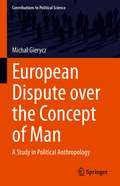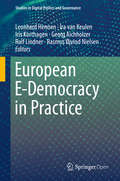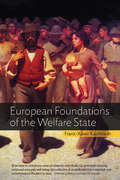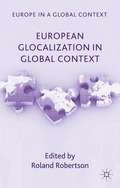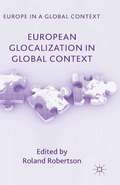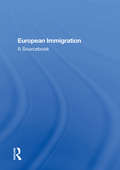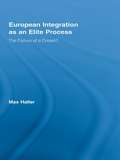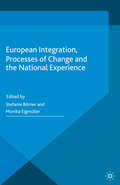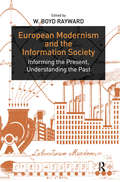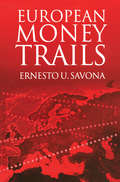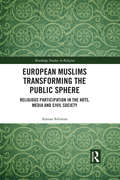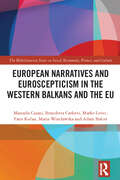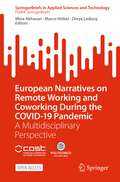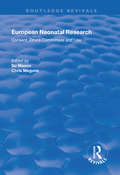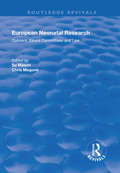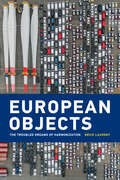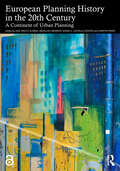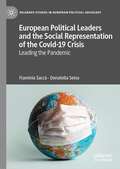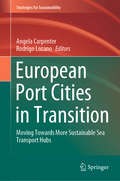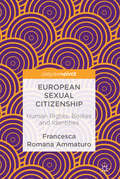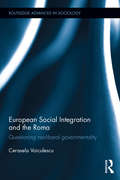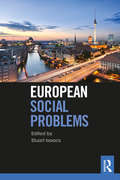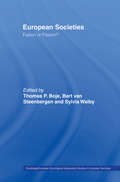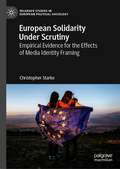- Table View
- List View
European Dispute over the Concept of Man: A Study in Political Anthropology (Contributions to Political Science)
by Michał GieryczThe book represents original research in a field of study rarely pursued while analysing the intellectual dimensions of disputes over ethically sensitive issues that occur in European Union politics. These disputes are generally analysed at ideological, ethical, economic and interstate levels. However, these references do not suffice in understanding the issue, which is related to a divergent perception of the essence of humanity and thus the subject matter of anthropology. The main research objective of the monograph is therefore to reconstruct the sources and the specific European Union way of thinking about the human being. Methodologically, the book expands the understanding of political anthropology within political science and presents a range of suitable instruments for pursuing anthropological research. At the theoretical level, it proposes an anthropological typology of the main currents of European political thought and reveals their prominence for the anthropological orientation of the EU's axiology. Empirically, it provides an analysis of the anthropological features of European Union institutions and policies in addition to discussing the relation between the axiological and anthropological positions of the main political and national groups within the EU.
European E-Democracy in Practice (Studies in Digital Politics and Governance)
by Ralf Lindner Georg Aichholzer Leonhard Hennen Ira Van Keulen Rasmus Øjvind Nielsen Iris KorthagenThis open access book explores how digital tools and social media technologies can contribute to better participation and involvement of EU citizens in European politics. By analyzing selected representative e-participation projects at the local, national and European governmental levels, it identifies the preconditions, best practices and shortcomings of e-participation practices in connection with EU decision-making procedures and institutions. The book features case studies on parliamentary monitoring, e-voting practices, and e-publics, and offers recommendations for improving the integration of e-democracy in European politics and governance. Accordingly, it will appeal to scholars as well as practitioners interested in identifying suitable e-participation tools for European institutions and thus helps to reduce the EU’s current democratic deficit. This book is a continuation of the book “Electronic Democracy in Europe” published by Springer.
European Foundations Of The Welfare State
by Franz-Xaver KaufmannWhile social welfare programs, often inspired by international organizations, are spreading throughout the world, the more far-reaching notion of governmental responsibility for the basic well-being of all members of a political society is not, although it remains a feature of Europe and the former British Commonwealth. The welfare state in the European sense is not simply an administrative arrangement of various measures of social protection but a political project embedded in distinct cultural traditions. Offering the first accessible account in English of the historical development of the European idea of the welfare state, this book reviews the intellectual foundations which underpinned the road towards the European welfare state, formulates some basic concepts for its understanding, and highlights the differences in the underlying structural and philosophical conditions between continental Europe and the English-speaking world.
European Glocalization in Global Context (Europe In A Global Context)
by Roland RobertsonThis book consists of a collection of essays that deal with glocalization in Europe, including the idea of Europeanization as glocalization. The contributors deal with a range of topics including migration, media, football, beauty, Christianity, democracy and the European Union.
European Glocalization in Global Context (Europe in a Global Context)
by Roland RobertsonThis book consists of a collection of essays that deal with glocalization in Europe, including the idea of Europeanization as glocalization. The contributors deal with a range of topics including migration, media, football, beauty, Christianity, democracy and the European Union.
European Immigration: A Sourcebook
by Anna TriandafyllidouWho are Europe's immigrants? This innovative volume provides a comprehensive overview of the immigration situation in all 25 EU countries. Each chapter is written by an expert and follows a common structure, allowing direct comparisons to be made between countries. Chapters provide a clear focus in terms of the methods used, data collected, literature reviewed and research questions addressed, and draw on hard-to-obtain material, including sources not previously published in English. Each chapter concludes with a critical assessment of the present migration situation of the country in question and its future prospects. Substantive introductory and concluding chapters offer a general overview of immigration in Europe, which complements and contextualizes the analytical and comparative insights of the individual countries. The first reference volume to provide comprehensive coverage of the EU, European Immigration will be essential for library collections and for scholars and policy-makers in the field.
European Integration as an Elite Process: The Failure of a Dream? (Routledge Advances in Sociology #Vol. 40)
by Max HallerMax Haller's impressive book presents an analysis of the process of European integration which keeps the relation between elites and citizens at the forefront. It is shown on the basis of new empirical data (surveys, interviews, analyses of documents and biographies) that European integration has been led since the beginning by the elites and that today there exists a considerable split between elites and citizens; this split is becoming more profound in the course of time. The book covers the following themes: - the structure, interests and behaviour of the different elites (political, economic, bureaucratic) - the expectations and perceptions of the populations concerning the integration process and the elites - the strategies of the elites to win the consent of the people, in view of widespread scepticism - proposals for reform of the EU, especially with regard to a strengthening of democratic elements which could reduce the split between elites and citizens. A timely and original read, this book will be a useful addition to the library of any political sociologist, political scientist or scholar of European integration.
European Integration, Processes of Change and the National Experience
by Stefanie Börner Monika EigmüllerIn order to better understand processes of European integration, this book offers a new perspective that compares past experiences of change to current transitional moments at the European level. It addresses key questions about European society, EU integration and social change to reveal the social construction of emergent polities and societies.
European Integration, Processes of Change and the National Experience (Palgrave Studies in European Political Sociology)
by Stefanie Börner Monika EigmüllerIn order to better understand processes of European integration, this book offers a new perspective that compares past experiences of change to current transitional moments at the European level. It addresses key questions about European society, EU integration and social change to reveal the social construction of emergent polities and societies.
European Modernism and the Information Society: Informing the Present, Understanding the Past
by W. Boyd RaywardUniting a team of international and interdisciplinary scholars, this volume considers the views of early twentieth-century European thinkers on the creation, dissemination and management of publicly available information. Interdisciplinary in perspective, the volume reflects the nature of the thinkers discussed, including Otto Neurath, Patrick Geddes, the English Fabians, Paul Otlet, Wilhelm Ostwald and H. G. Wells. The work also charts the interest since the latter part of the nineteenth century in finding new ways to think about and to manage the growing body of available information in order to achieve aims such as the advancement of Western civilization, the alleviation of inequalities across classes and countries, and the promotion of peaceful coexistence between nations. In doing so, the contributors provide a novel historical context for assessing widely-held assumptions about today's globalized, 'post modern' information society. This volume will interest all who are curious about the creation of a modern networked information society.
European Money Trails
by Ernesto SavonaEuropean Money Trails examines trends in organized crime across Europe, including money laundering methods and the mechanisms and instruments used to conceal the disposal of the proceeds of crime.By drawing on primary and other authoritative sources, Savona provides a report on national experiences of criminal organization unavailable elsewhere. It will prove especially useful to policymakers and users, as well as scholars looking to understand the criminal dynamics that underlie sophisticated, international offending.
European Muslims Transforming the Public Sphere: Religious Participation in the Arts, Media and Civil Society (Routledge Studies in Religion)
by Asmaa SolimanAnti-Muslim voices have become louder in many places in the midst of ongoing atrocities undertaken in the name of Islam. As a result, much of the creative participation of Western Muslims in the public sphere has become overshadowed. This tendency is not only visible in political discussions and the media landscape, but it is also often reflected in academia where research about Muslims in the West is predominantly shaped by the post 9/11 narrative. In contrast, European Muslims Transforming the Public Sphere offers a paradigm shift. It puts forward a new approach to understanding minority public engagement, suggesting that we need to go beyond conceptualisations that look at Muslims in the West mainly through the minority lens. By bringing into dialogue minority-specific and non-minority specific concepts, the book offers a relevant complement. Using young German Muslims engaged in media, the arts and culture and civil society as ten case studies, this book utilises the concepts of counterpublics and participatory culture to re-examine Muslims' engagement within the European public sphere. It presents a qualitative analysis, which has resulted from two years of ethnographic fieldwork and participant observation, in-depth interviews and primary source analysis of material produced by the research participants. This book is a unique insight into the outworking of multiculturalism in Western Europe. It illustrates the many-sidedness of young Muslims’ public contributions, revealing how they transform European public spheres in different ways. Therefore, it will be a vital resource for any scholar involved in Islamic Studies, the Sociology of Religion, Religious Studies, Cultural Studies and Media Studies.
European Narratives and Euroscepticism in the Western Balkans and the EU (The Mobilization Series on Social Movements, Protest, and Culture)
by Marko Lovec Manuela Caiani Benedetta Carlotti Maria Wincławska Faris Kočan Adam BalcerMoving from a social movement perspective, this timely volume examines narratives on Euroscepticism and frames on Europe from below, at the party and social movement levels. Revealing perspectives from both the Right and the Left, it unpacks the emergence, re-emergence and increase in critical ‘voices’ and opposition towards Europe.Based on extensive fieldwork in two candidate countries for accession to the EU and three member states, it offers insight from analysis of focus groups, interviews with Eurosceptic and pro-European political actors and ordinary citizens, together with frame analysis and scrutiny of archival material, electoral manifestoes and organisational documents. Revealing the development of Eurocritical frames, it demonstrates the differences and similarities in narratives used to address Europe and the conceptualisation of Euroscepticism. Key cases examined include the rise of illiberalism in post-transition Slovenia; complex Euroscepticism in Poland; the path from strong support to harsh opposition in Italy; indecision over membership in North Macedonia; anticipating the future while revisiting the past in Bosnia and Herzegovina.Offering guidelines for the direction of future research and policy, European Narratives and Euroscepticism in the Western Balkans and the EU is essential reading for scholars and students of political sociology, political science, European studies and international relations, as well as policy makers concerned with trajectories pro and against Europe and the European integration process.
European Narratives on Remote Working and Coworking During the COVID-19 Pandemic: A Multidisciplinary Perspective (SpringerBriefs in Applied Sciences and Technology)
by Mina Akhavan Marco Hölzel Divya LeducqThis open access book offers a multidisciplinary and comprehensive perspective regarding the immediate and long-term effects of the Covid-19 pandemic on coworking spaces in the European Region. The current pandemic has imposed several effects on work and spaces for work. Some are immediate effects and will last for a short time (such as the closing down of the space), some will last longer (namely, the reorganisation of the space to meet the physical distancing), and some will stay for a long time (remote working and hybrid working). Although the literature on coworking spaces and the effects of the pandemic is growing fast, empirical studies are yet limited. Within this context, this book seeks a twofold aim: (i) to contribute to the fast-growing literature on coworking space and their effects at different scales; (ii) to present a multidisciplinary perspective about the effects of the yet-lasting Corona-pandemic effects on the patterns of remote working and consequently on coworking spaces, as the most diffused form of new working spaces.
European Neonatal Research: Consent, Ethics Committees and Law
by SU MASON and CHRIS MEGONEThis title was first published in 2001. An important book presenting the results of the European Union funded EURICON project in biomedical ethics. Involving experts in eleven countries, this project was motivated by European neonatal clinicians’ concerns about the problem of obtaining informed consent in neonatal research. It addressed the difficulties of obtaining consent from subjects involved in such research, and investigated the relevance and appropriateness of obtaining consent from parents. The project also examined the work of Research Ethics Committees in Europe. It explored their responses to EURICON’s analysis of the views of clinicians and parents, and their attitudes towards the relevant laws and legal requirements. The wide geographical scope of the project enabled international comparisons of the opinions of clinicians and parents, the legal frameworks governing neonatal research, and the effectiveness of Research Ethics Committees. This is the first such investigation on a European scale, and it offers a unique interdisciplinary approach to these issues. Incorporating clinical, ethical, legal and sociological perspectives, the results and recommendations presented in this book will be of widespread significance to practitioners, researchers and policy makers throughout Europe and beyond.
European Neonatal Research: Consent, Ethics Committees and Law (Routledge Revivals)
by Chris Megone Su MasonThis title was first published in 2001. An important book presenting the results of the European Union funded EURICON project in biomedical ethics. Involving experts in eleven countries, this project was motivated by European neonatal clinicians’ concerns about the problem of obtaining informed consent in neonatal research. It addressed the difficulties of obtaining consent from subjects involved in such research, and investigated the relevance and appropriateness of obtaining consent from parents. The project also examined the work of Research Ethics Committees in Europe. It explored their responses to EURICON’s analysis of the views of clinicians and parents, and their attitudes towards the relevant laws and legal requirements. The wide geographical scope of the project enabled international comparisons of the opinions of clinicians and parents, the legal frameworks governing neonatal research, and the effectiveness of Research Ethics Committees. This is the first such investigation on a European scale, and it offers a unique interdisciplinary approach to these issues. Incorporating clinical, ethical, legal and sociological perspectives, the results and recommendations presented in this book will be of widespread significance to practitioners, researchers and policy makers throughout Europe and beyond.
European Objects: The Troubled Dreams of Harmonization (Inside Technology)
by Brice LaurentHow interventions based on objects—including chemicals, financial products, and consumer goods—offer a path to rethink European integration.Interventions based on objects, Brice Laurent claims, have become a dominant path for European policy-making. In European Objects, Laurent analyzes the political consequences of these interventions and their democratization. He uses the term &“European objects&” to describe technical entities that are regulated—and thereby transformed—by European policies. To uncover the bureaucratic and regulatory intricacies of European governance, Laurent focuses on a series of these objects, including food products, chemicals, financial products, consumer goods, drinking water, and occupational environments. Laurent argues that taking European objects seriously offers a way to rephrase the dreams of harmonization and, eventually, rethink the constitutional strength of European integration. Laurent doesn&’t just clarify how European regulation works, but also explores ways to realize long-term objectives for European integration, such as a harmonized market or an objective expertise. Regulation is best understood as &“regulatory machinery&” bringing together various types of legal constraints, material interventions on objects, and the imagining of desirable futures. Analyzing European objects enables Laurent to explore what regulation has become after years of evolution have made it a central component of the European policy world. He offers practical illustrations of how the regulatory machinery functions today. If Europe succeeds at reinventing the terms of its legitimacy with objects that matter for the European publics, it will provide a telling demonstration that the opposition of expertise and populism is not the unavoidable fate of liberal democracies.
European Planning History in the 20th Century: A Continent of Urban Planning
by Max Welch Guerra Abdellah Abarkan Martin Pekár Castrillo Romón, María A. Victoria GrauThe history of Europe in the 20th century is closely tied to the history of urban planning. Social and economic progress but also the brute treatment of people and nature throughout Europe were possible due to the use of urban planning and the other levels of spatial planning. Thereby, planning has constituted itself in Europe as an international subject. Since its emergence, through intense exchange but also competition, despite country differences, planning has developed as a European field of practice and scientific discipline. Planning is here much more than the addition of individual histories; however, historiography has treated this history very selective regarding geography and content. This book searches for an understanding of the historiography of planning in a European dimension. Scholars from Eastern and Western, Southern and Northern Europe address the issues of the public led production of city and the social functions of urban planning in capitalist and state-socialist countries. The examined examples include Poland and USSR, Czech Republic and Slovakia, UK, Netherlands, Germany, France, Portugal and Spain, Italy, and Sweden. The book will be of interest to students and scholars for Urbanism, Urban/Town Planning, Spatial Planning, Spatial Politics, Urban Development, Urban Policies, Planning History and European History of the 20th Century.
European Political Leaders and the Social Representation of the Covid-19 Crisis: Leading the Pandemic (Palgrave Studies in European Political Sociology)
by Flaminia Saccà Donatella SelvaEuropean leaders faced the Covid-19 pandemic by adopting very different leadership styles, characterized by diverging approaches to crisis communication, power management, and relationship-building with actors and stakeholders in the public sphere. The pandemic also highlighted the importance of the already-existing cleavage between populism and technocracy, positioning it at the centre of the political scene.These complex circumstances required a multidisciplinary perspective grounded in political sociology and communication studies. To address these issues, this book analyses the communication and leadership styles of seven European leaders, grouped into ‘political families’. It analyses the cases of Angela Merkel and Erna Solberg to understand if and how female leaderships differentiated from their male counterparts. It then analyses the relationship between techno-populism and professional politics by comparing the cases of Giuseppe Conte, Emmanuel Macron and Pedro Sanchez. Finally, it focuses on populist leaders Boris Johnson and Victor Orbán, who represent emblematic cases with opposite outcomes.
European Port Cities in Transition: Moving Towards More Sustainable Sea Transport Hubs (Strategies for Sustainability)
by Angela Carpenter Rodrigo LozanoSeaports, as part of urban centers, play a major role in the cultural, social and economic life of the cities in which they are located, and through the links they provide to the outside world. Port-cities in Europe have faced significant change, first with the loss of heavy industry, emergence of Eastern European democracies, and the widening of the European Community (now European Union) during the second half of the twentieth century, and more recently through drivers to change including the global Sustainable Development Agenda and the European Union Circular Economy Agenda.This book examines the role of modern seaports in Europe and consider how port-cities are responding to these major drivers for change. It discusses the broad issues facing European Sea Ports, including port life cycles, spatial planning, and societal integration. May 2019 saw the 200th anniversary of the first steam ship to cross the Atlantic between the US and England, and it is just over 60 years since the invention of the modern intermodal shipping container – both drivers of change in the maritime and ports industry. Increasing movements of people, e.g. through low cost cruises to port cities, can play a major role in changing the nature of such a city and impact on the lives of the people living there. This book brings together original research by both long-standing and younger scholars from multiple disciplines and builds upon the wider discourse about sea ports, port cities, and sustainability.
European Sexual Citizenship: Human Rights, Bodies and Identities
by Francesca Romana AmmaturoThis book is an innovative and critical contribution to the study of the human rights of lesbian, gay, bisexual, transgender, intersex and queer (LGBTIQ) people in the context of Europe. Combining legal and Foucauldian approaches, it investigates the ways in which current discourses about LGBTIQ rights in Europe are tightly bound to contemporary debates about national and trans-national citizenship. The author defines and analyzes the concept of 'multisexual citizenship' to illustrate new, flexible forms of sexual and gendered citizenship that could radically transform practices of citizenship and the current human rights framework in Europe. She does this by combining critical deconstructions of the case law of the European Court of Human Rights with ethnographic observations and sociological analysis. This interdisciplinary work will appeal to sociologists, lawyers and researchers of gender and LGBTIQ rights.
European Social Integration and the Roma: Questioning Neoliberal Governmentality (Routledge Advances in Sociology)
by Cerasela VoiculescuIn the field of political sociology and European studies, there has long been a discussion on transnational neoliberal development and ethnic groups’ self-governance. Notwithstanding, there has been limited exploration in relation to modes of knowledge production associated with neoliberal governance of the Other (e.g. ethnic and indigenous groups), which capture its idiosyncratic modes of political expression and empowerment. Drawing on Michel Foucault’s political philosophy, this book discusses European social integration as transnational neoliberal governmentality and challenges its epistemologically constituted subaltern subject. Neoliberalism is questioned in relation to its programs of securitisation of poverty and authoritarian models of self-governance associated with instrumentality of the market. In this context, the book’s rich political historical ethnography develops a new framework for the study of social power. Furthermore, inspired by Jacques Rancière's radical philosophy, European Social Integration and the Roma proposes a new mode of knowledge production about populations excessively subjected to neoliberal governmentality, heralding the epistemological decolonisation of the neoliberal subject. Presenting an insightful new prospect in critical sociology as well as the conceptualization of power and the application of theories of governmentality, this book will appeal to scholars interested in the areas of political sociology and anthropology, international relations, social and political theory/philosophy and post-development studies.
European Social Problems
by Stuart IsaacsEuropean Social Problems is the first book to examine social issues in Europe from the perspective of the social sciences. It considers many of these social problems following the UK’s ‘leave’ vote. Key topics examined here include: immigration; multiculturalism and religion; health; inequalities; education; riots and protest; drugs and crime; sexuality. These core issues run as a thread through Europe and are experienced by Europeans themselves as social problems. As such, this text facilitates students’ direct engagement with some of the problematic constituents in their own lives. This text is suitable for those studying social policy, sociology, politics, international relations, criminology and education studies. In this way it functions as an accessible ‘reader’ for final year undergraduates as well as postgraduate students.
European Societies: Fusion or Fission? (Studies in European Sociology #Vol. 1)
by Sylvia Walby Thomas P. Boje Bart Van SteenbergenAre the recent developments in Europe bringing countries together or pulling them apart? The leading experts in this book (including Sheila Allen, Marlis Buchmann, Piotr Sztompka, and Patrick Ziltener) cover a wide range of subjects, including the move towards political democracy and market economy in Central and Eastern societies, the project of the European Union, ethnic conflict, the rise of nationalism, social exclusion and women's role in public life.
European Solidarity Under Scrutiny: Empirical Evidence for the Effects of Media Identity Framing (Palgrave Studies in European Political Sociology)
by Christopher StarkeThis book explores the processes through which European solidarity is constructed. More specifically, it investigates how the media's framing of European identity can facilitate and/or impede the emergence of European solidarity on the individual level. Through an online experiment that tested the effect of two different media identity frames on individual solidarity during the European debt crisis, the author argues that the exposure to news articles using a value-based identity frame boosts solidarity compared to an economic identity frame. This interdisciplinary work will be of interest to scholars of political sociology, political communication and political psychology, as well as any researchers who study European integration.
